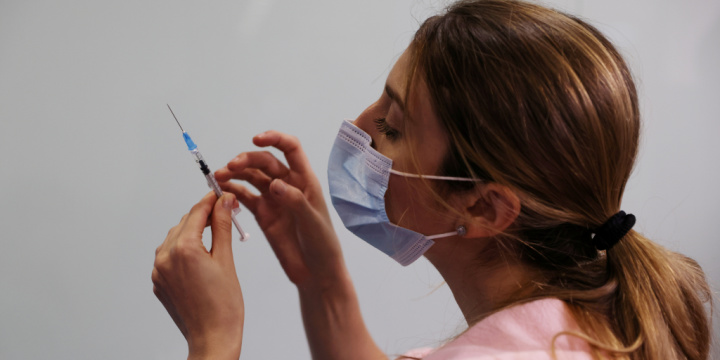
A medical worker prepares to administer a second vaccination injection against the coronavirus disease as Israel continues its national vaccination drive, during a third national COVID-19 lockdown, at Tel Aviv Sourasky Medical Center (Ichilov Hospital) in Tel Aviv, Israel January 10, 2021. Photo: REUTERS/ Ronen Zvulun.
Monday, December 14, was the beginning of a historic week for Americans weary of the battle against COVID-19. The first doses of the Pfizer-BioNTech vaccine were administered, with cable news broadcasting real-time coverage of front-line doctors and nurses receiving inoculations to both cheers and tears. Prominent officials followed as did public announcements urging vaccine compliance. The end of the week saw the FDA add the Moderna vaccine to its emergency use approvals.
Nearly one month later, the anticipated and deadly “second surge” is raging alongside the vaccination effort. Additionally, an inadequate vaccine distribution plan has resulted in only 6.7 million Americans receiving the more than 22.1 million available doses. Even if the new administration succeeds in overhauling the nationwide process, vaccinating a sufficient number of Americans to achieve the longed-for “herd immunity” (the true end of this pandemic) may take over half a year. Until then, we will continue to need masks, social distancing, and patience. Tragically, people will continue to get sick and die.
But halfway around the world, in a region that typically makes headlines only when something goes wrong, a robust and coordinated vaccination initiative has placed Israel at the epicenter of COVID success. With rapidly secured doses of the vaccine (both Pfizer-BioNTech and Moderna) Israel is vaccinating over 100,000 people (over one percent of its population) per day.
As of earlier this week, over 1.8 million people, close to 20 percent of the population, have been vaccinated in barely over three weeks. This number was achieved by a variety of means: opening vaccination centers in quickly erected tents in public squares, a robust electronic notification and distribution network made possible by Israel’s hi-tech national healthcare system, and keeping vaccination centers open around the clock, where young people were invited to drop by in the wee hours of the morning to receive their shots from “extra” doses, which would have to be thrown away if not used.
Related coverage

January 15, 2021 12:33 pm
The Israeli effort now has a name, “Operation Getting Back to Life.” Vaccination proceeded so fast it seemed the country would outpace its supply, but under a historic agreement with Pfizer, Israel is now sharing its medical data in exchange for rapid resupply, effectively turning the entire country into a massive Stage Four Clinical Trial. This makes Israel a “global model state for the rapid vaccination of an entire country,” according to Prime Minister Benjamin Netanyahu, who further asserted that Israel will be “the first country in the world to emerge from the coronavirus.” Indeed, Israel is on track to vaccinate all citizens older than the age of 16 by the end of March.
This swift and coordinated rollout is occurring against the backdrop of Israel’s perpetual political infighting, which resulted in the collapse of its current governing coalition just before the new year. Far from a utopia of obedience and efficiency, Israel is a real-life, chaotic, healthy democracy that can nonetheless get results in a time of need: an ideal model for the United States and an eagerly watching world.
Not since World War II has America faced such a total disruption to the life of the nation. Yet Israel, having not only survived but thrived amid decades of war, terrorism and existential threats, long ago learned a basic truth that eludes many Americans: life can change in an instant, and safety comes not from rigidity, but from flexibility.
As a result, Israel’s institutions, though sometimes chaotic, are built on principles of adaptability and rapid response. In March, Israel was one of the first to quickly shut its borders and impose lockdowns — almost completely stopping the virus in its tracks — while other countries were still debating first steps. When re-opening the economy proved problematic last fall, Israel imposed a second lockdown. Finally, when new, rapidly spreading strains of the virus appeared in the United Kingdom and South Africa last month, it took Israel mere days to close its borders, tighten its quarantine requirements for returning citizens, and impose a third lockdown. All of this at a time when the country is preparing for its fourth national election in under two years.
In Israel, “face-palm” level uncertainty co-exists alongside stunning efficiency.
Meanwhile, although initial polls had seemed to indicate that over half of Israel’s population was opposed to taking the vaccine, in reality, Israelis have demonstrated quite the opposite. Showing tremendous and atypical trust, the population has moved with stunning speed and unusual orderliness to get vaccinated in large numbers, and in order of risk category.
This is noteworthy, as Israeli people are notoriously mistrustful of their leaders, outspoken, and argumentative. However, in the case of an emergency, Israelis rise to the occasion, unified and ready to cooperate.
It is often said that Israel is the world’s “canary in the coal mine,” a source of early insight to global problems and potential solutions. The designation of Israel as a “global model state” for the rapid vaccination of an entire country demonstrates that the United States and world at large would do well to emulate her.
But to truly prevail over the pandemic requires the ability to discern between truth and lies. Regrettably, it had been falsely reported that Israel initially withheld the vaccine from the Palestinians. In truth, the Palestinians themselves preferred to acquire the vaccine from other sources, and had shunned Israel’s assistance.
In the mid-December, Palestinian Authority (PA) Prime Minister Mohammed Shtayyeh stated that the PA was working with Russia, China, the US, and Great Britain to obtain the vaccine. The PA’s proud insistence on self-sufficiency was well articulated by one health ministry official who said, “we are not a department in the Israeli Defense Ministry. We have our own government.”
Tragically, the PA did not succeed in its ambitious plan to function independently, and only last Wednesday finally approached Israel for assistance. Israel responded immediately: providing initial small numbers of doses for critical humanitarian cases and coordinating with the World Health Organization to help ensure a larger shipment, which is currently expected next month. This is not only a humanitarian imperative but self-protective, as the virus is not deterred by borders or politics.
It is important to set the record straight, because at this moment in history, false allegations and political agendas serve only to distract us from the important, life saving lessons that Israel has to contribute to the world. In a time of need, no one is helped by misinformation, everyone is helped by truth.
As the world moves from horror to hope, let us pledge to uphold the truth while coming together to overcome one of the biggest challenges in a generation. The future of our world literally hangs in the balance.
Daniel Pomerantz is the CEO of HonestReporting.com, an adjunct professor at the Bar Ilan and IDC Universities in Israel, and an on-air expert in business, law and political issues. Twitter: @danielspeaksup
This article was originally published by Newsweek.
Related posts:
Views: 0
 RSS Feed
RSS Feed

















 January 16th, 2021
January 16th, 2021  Awake Goy
Awake Goy  Posted in
Posted in  Tags:
Tags: 
















